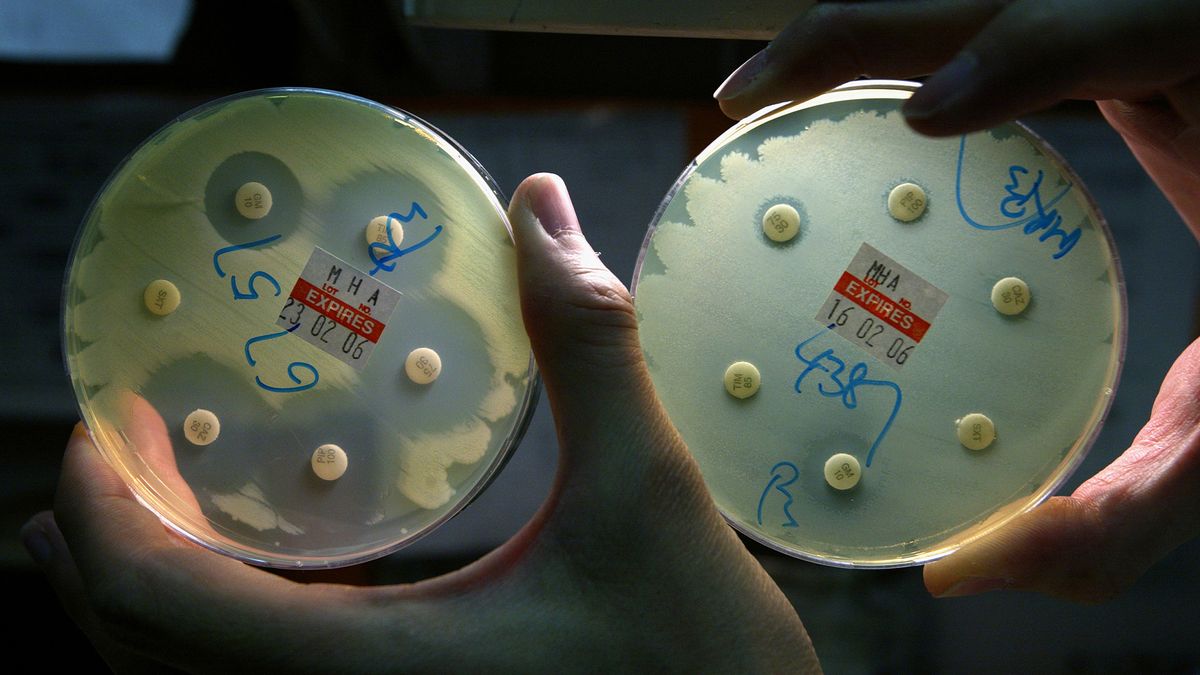On driving factor is the (over)use of antibiotics in animal agriculture. It’s weird the article touches this issue in just one sentence…
“Over 70 percent of antibiotics sold in the United States are given to livestock, including cattle, which translates to significant human health impacts.”
“Unlike with human medicine, however, antibiotics are often fed to cattle as a preventative measure, rather than as a treatment.”
“Antibiotic resistance in cattle does not only affect the health of the cattle, it impacts people as well because many of the antibiotics given to cattle are also used in human medicine. Eating meat or consuming milk from an animal with antibiotic-resistant bacteria may infect a human with that same resistant bacteria”
Citations: National Geographic
The Wikipedia article is also very comprehensive and nuanced: https://en.wikipedia.org/wiki/Antibiotic_use_in_livestock
“I see the disinfectant, where it knocks it out in one minute. And is there a way we can do something like that by injection inside or almost a cleaning, because you see it gets in the lungs and it does a tremendous number on the lungs.”
“I said supposing you brought the light inside the body, which you can do either through the skin or in some other way. And I think you said you’re going to test that too… So, we’ll see, but the whole concept of the light, the way it kills it in one minute - that’s pretty powerful.”
Or bleach apparently. lol.
Wasn’t there a whole thing about bacteriophage treatment and supplement to antibiotics?
Like, “if bacteria develop resistance to one it reduces resistance to the other!” kinda deal?
Long story short: bacteriophage are extremely difficult to fit in the current legal/regulatory framework of the medical/pharma world/system.
Bacteriophage are not stable compounds such as chemical molecules (antibiotics, etc…). They evolve and change, adapting to bacterial evolution (or just spontaneously because we’re talking about organisms, who sometimes just changes). It may be an advantage from a efficacity point of view, buts it’s a big no-no from a regulation point of view.
This makes is harder to have real trials (even if things progress slowly).
Then you have all the biological questions about injecting live virus in an patient and the risk of immune response.
Then you have the complexity of both producing phages in a stable manner (remember: these fuckers have a tendcy to “evolve” on their own) as well as shipping them (require refrigeration all the way, contrary to antibiotic pills).
Source: bacteriophage were the subject of my master thesis, even if it was a while ago.
Just like how in climate change is that we use plastic straws, don’t look at how 80% of the pollution is industrial and/or Chinese in origin.
Or in Canada where rents are so high in Vancouver and Toronto that they’re redefining budgeting for renters, from 1/3 to half and even 2/3rds instead of dealing with real estate speculation.
Are you saying China is responsible for 80% of emissions? That’s definitely false.
Badly written. 80% are industrial. They are, based on their public numbers, responsible for a third of the world’s CO2 though.
Their official numbers put them at number 1 CO2 emitter, and pollute more then next 5.
Well it just seems odd to fold together industrial and Chinese emissions. Nationally and by sector are two totally different ways of dividing up emissions.
Anyway China is a major source of emissions and deserves criticism for that but it doesn’t seem very relevant overall.
@Kbin_space_program @throws_lemy @LibertyLizard As pointed out elsewhere, it’s quite hypocritical to point to China to reduce emissions generated by manufacturing stuff for the West.
That was partially true more than a decade ago, since they could have had laws in place to prevent those emissions.
Now though they’re more making things for themselves, and any attempt on their part to declare themselves a “developing country” is a sham.
@Kbin_space_program @throws_lemy @LibertyLizard Or, you know, we could trace those emissions back to the source, which would land the blame squarely on the tons of US companies responsible.
Also, as an aside, why don’t you compare per capita emissions, since China has > 3 times the population of the US?
Because the ecosystem doesn’t care about pollution per capita.
Also, the reason the US is so high is because it refines most of the world’s oil.
Same reason Canada is so high. Alberta, by itself, is more than half of Canada CO2 emissions.
and even if it was true, guess why they have so much emissions! It’s to make products for us consumers in the west!
Yes although I think China is a wealthy and capable enough country at this point that we can expect them to start reducing emissions like most other countries. But they aren’t really attempting to do this, and deserve criticism for that. As do Westerners who uncritically buy products from them despite their deeply problematic production model.






